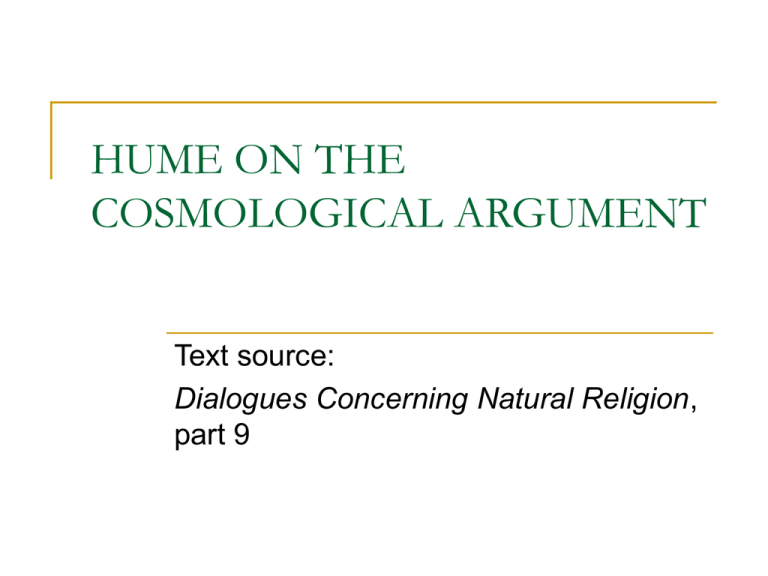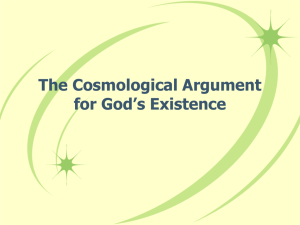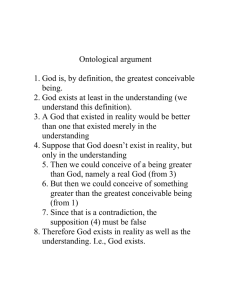Phil 20C / Holden / Spring 2005 / lecture 23
advertisement

HUME ON THE COSMOLOGICAL ARGUMENT Text source: Dialogues Concerning Natural Religion, part 9 THE COSMOLOGICAL ARGUMENT This argument maintains that there must be a ‘first cause’ of everything, and that this first cause is God. It is a leading argument in natural religion, endorsed by: Aristotle Aquinas Locke (Essay 4.10) Muslim ‘kalam’ theologians Various current theistic philosophers DEMEA STATES THE ARGUMENT: “Whatever exists must have a cause or reason of its existence, it being absolutely impossible for anything to produce itself or be the cause of its own existence. In mounting up, therefore, from effects to causes, we must either go on in tracing an infinite succession, without any ultimate cause at all, or must at last have recourse to some ultimate cause that is necessarily existent: Now that the first supposition is absurd may thus be proved. In the infinite chain or succession of causes and effects, each single effect is deemed to exist by the power and efficacy of that cause which immediately preceded; but the whole eternal chain or succession, taken together, is not determined or caused by anything: And yet it is evident that it requires a cause or reason, as much as any particular object which begins to exist in time. The question is still reasonable why this particular succession of causes existed from eternity, and not any other succession or no succession at all. If there be no necessarily existent being, any supposition which can be formed is equally possible; nor is there any more absurdity in nothing’s having existed from eternity than there is in that succession of causes which constitutes the universe. … ” continued on next slide DEMEA STATES THE ARGUMENT (Continued) “…What is it, then, which determined something to exist rather than nothing, and bestowed being on a particular possibility rather than the rest? External causes, there are supposed to be none. Chance is a word without a meaning. Was it nothing? But that can never produce anything. We must therefore have recourse to a necessarily existent being who carries the reason of his existence in himself; and who cannot be supposed not to exist, without an express contradiction. There is consequently such a Being— that is, there is a Deity.” (DCNR part 9, p.458) THE ARGUMENT RECONSTRUCTED 1. Everything that exists must have a cause. 2. In tracing effects back to their causes we must either (a) go on forever tracing an infinite series of causes and effects, or (b) have recourse to an ultimate first cause – a selfcaused being “who carries the reason of his existence in himself”. 3. Given option (a), we still need to explain what caused the whole infinite series. 4. And this could only be a self-caused being. --------------5. So, given either the (a) scenario or the (b) scenario, there must be an ultimate self-caused being. POSSIBLE OBJECTIONS TO THE COSMOLOGICAL ARGUMENT (i) Reject premise 1? Does everything require a cause? Mightn’t the existence of some things just be a brute fact? (ii) Reject premise 3? Once you’ve given an explanation for each member of the whole collection or series, you’ve given an explanation of the whole collection or series. You don’t need to give some further explanation of the whole, apart from explaining where each member in turn came from. (See p.56) POSSIBLE OBJECTIONS TO THE COSMOLOGICAL ARGUMENT (Cont.) (iii) The argument requires that we make sense of a being that is its own cause, “a necessarily existent Being who carries the reason of his existence in himself; and who cannot be supposed not to exist, without an express contradiction” (p.55). But it is impossible that any being could have this odd property of necessary existence. “It will still be possible for us, at any time, to conceive the nonexistence of what we formerly conceived to exist; nor can the mind ever lie under a necessity of supposing any object to remain always in being; in the same manner as we lie under a necessity of always conceiving twice two to be four. The words, therefore, ‘necessary existence’ have no meaning; or, which is the same thing, none that is consistent” (p.56). POSSIBLE OBJECTIONS TO THE COSMOLOGICAL ARGUMENT (Cont.) (iv) Even if the argument did prove an ultimate first cause or necessarily existent being, why think that this is the traditional God of western theology? “But further, why might not the material universe be the necessarily existent Being, according to this pretended explication of necessity?” (p.56)






